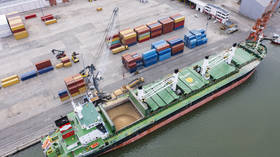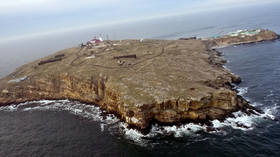Moscow suspects UK of seeking to ‘infiltrate’ Black Sea

The UK is looking for a “pretext” which would allow the Royal Navy to “infiltrate” the Black Sea and to take charge of the release of grain stocks from Ukrainian ports, Russian Foreign Minister Sergey Lavrov claimed on Sunday.
Kiev and Western nations have accused Russia of blocking food exports from Ukraine’s Black Sea ports, allegedly contributing to surging global food prices. Moscow denies the allegation, saying it has been offering safe passage to freighters but that Ukraine is preventing civilian ships from leaving the ports, including Odessa. Russia also says Kiev’s deployment of sea mines has created a threat to shipping in the area.
In an interview for Rossiya 24 news channel, Lavrov noted that some countries are trying to use the food security issue “in the worst possible way” by accusing Moscow “of something it is not involved in” and by “whitewashing” Ukraine.
In this context, the Russian minister pointed to the statements of the Britain’s Prime Minister Boris Johnson and Foreign Minister Liz Truss. From Lavrov’s point of view, they “are clearly trying to create conditions, to find pretexts for the Royal Navy to infiltrate the Black Sea and become almost in charge of all the processes of releasing grain from those ports that have been mined by Ukrainians and which Ukrainians must clear.”
According to the Russian foreign minister, there are “many manifestations of those convulsions” in the Western politicians’ actions, especially now, when they are facing various domestic problems amid elections which have to take place “every two, three or four years.” Lavrov claimed that “the principles of neoliberal democracy” require these politicians to divert the attention of the population. Therefore, the minister argued, it makes sense to follow the debates about possible advantages of “states with a strong central government” and the ways they are responding to the various crises.
During the recent G7 summit in Germany, the British prime minister called for urgent action to help move grain supplies out of the Black Sea ports, adding that British expertise in “remote de-mining” and insurance of shipping in contested waters could help in fulfilling this task.
The UK also pledged £10 million ($12.1 million) in materials and equipment to Ukraine Railways to repair rail infrastructure and help get grain out of the country by rail. The government is also putting £1.5 million ($1.8 million) to develop a testing process “to identify whether grain sold by Russia on the world market has been illegally taken from Ukraine.”













